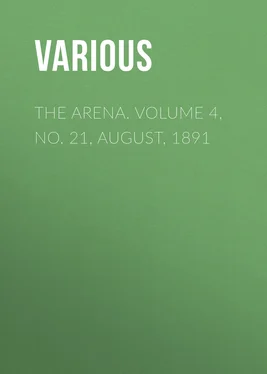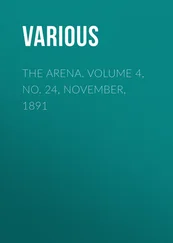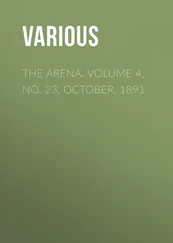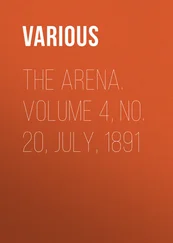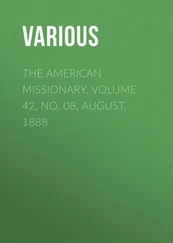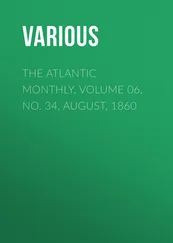Various - The Arena. Volume 4, No. 21, August, 1891
Здесь есть возможность читать онлайн «Various - The Arena. Volume 4, No. 21, August, 1891» — ознакомительный отрывок электронной книги совершенно бесплатно, а после прочтения отрывка купить полную версию. В некоторых случаях можно слушать аудио, скачать через торрент в формате fb2 и присутствует краткое содержание. Жанр: foreign_antique, periodic, foreign_edu, на английском языке. Описание произведения, (предисловие) а так же отзывы посетителей доступны на портале библиотеки ЛибКат.
- Название:The Arena. Volume 4, No. 21, August, 1891
- Автор:
- Жанр:
- Год:неизвестен
- ISBN:нет данных
- Рейтинг книги:4 / 5. Голосов: 1
-
Избранное:Добавить в избранное
- Отзывы:
-
Ваша оценка:
- 80
- 1
- 2
- 3
- 4
- 5
The Arena. Volume 4, No. 21, August, 1891: краткое содержание, описание и аннотация
Предлагаем к чтению аннотацию, описание, краткое содержание или предисловие (зависит от того, что написал сам автор книги «The Arena. Volume 4, No. 21, August, 1891»). Если вы не нашли необходимую информацию о книге — напишите в комментариях, мы постараемся отыскать её.
The Arena. Volume 4, No. 21, August, 1891 — читать онлайн ознакомительный отрывок
Ниже представлен текст книги, разбитый по страницам. Система сохранения места последней прочитанной страницы, позволяет с удобством читать онлайн бесплатно книгу «The Arena. Volume 4, No. 21, August, 1891», без необходимости каждый раз заново искать на чём Вы остановились. Поставьте закладку, и сможете в любой момент перейти на страницу, на которой закончили чтение.
Интервал:
Закладка:
Various
The Arena / Volume 4, No. 21, August, 1891
THE UNITY OF GERMANY
“The Idea Whence Sprang the Fact.” 1 1 “L’Allemagne lepnis, Leibniz. Essai sur le Développement de la Conscience Nationale en Allemagne.” By Prof. Lévy Brühl, Paris. 1 vol. Hachette, 1890.
Since the Great French Revolution of 1789 and its immediate consequence in the military despotism of Bonaparte, nothing has occurred that has so convulsed the Old World and so altered the conditions of men and things, as the establishment of the United German Empire in 1870. The men of our time are obliged to know how this event came about, or remain in ignorance of all that has happened during the twenty years following it—that is, to ignore their own political status.
Now two records of this enormous change in all our destinies exist; as yet there are but two, and modern men are bound in duty to take cognizance of them. One is the famous “History,” written in Germany by Heinrich von Sybel; the other the work of Prof. Lévy Brühl, published in France. Both must be read. 2 2 “History of the Creation of United Germany.” 5 vols. Heinrich v. Sybel, Berlin, 1890.
The remarkable book of M. Lévy Brühl on the reconstruction of the German Empire cannot be read by itself or separated from the scarcely less remarkable one of Heinrich von Sybel, the fifth and latest volume of which has just appeared. The two require to be studied together, for though starting from opposite standpoints, they explain each other and distinctly show the impartial reader where to recognize the real raison d’ ètre of German unity. When Sybel speaks, as he constantly does, of the creation of Germanic unity, after the war of 1870, he, as a matter of fact, adopts the French theory, while the independent French writer exposes from a far more German point of view, what have been and what are the causes underlying the present formation of the various component parts of Germany into a State. The title of either tells sufficiently its own tale. Sybel proclaims at once the:—
“ Begründing des Deutschen Reiches durch Wilhelm! ” whilst Lévy Brühl announces the progress of the “ National Conscience as Developed in a Race. ”
Sybel’s is the narrative of a past that is doubly ended, the past of a country and of a political system, the past of Prussia as personified by the Hohenzollerns, and of a military and oligarchical absolutism as represented by Prince Bismarck and Marshal Von Moltke. It is the chronicle of an epoch whose glories, from 1700 to 1870, none can dispute, but whose real life was extinct, and whose capacity of future expansion in its original sense was stopped at Sédan, or a few months later, at Versailles. Sybel conceives his history as a thoroughly well-trained functionary must conceive it; he is brought up in traditional conventionalities, and is rather even an official than a “public” servant.
The foreign author, on the contrary, feels what has lurked during long ages in the soul of the innominate throng of the people, and been expressed in the thoughts and impulses of such men as Hagern, Scharnhorst, Gueiseman, and Stein, Germans , patriots who taught Prussia to speak, think, act, and embody the inspirations, passions, and instincts of a whole land; arousing the conscience and vindicating the honor of seemingly divided communities whose hearts were already one .
No sooner had M. Lévy Brühl’s book appeared than the effect was evident; it was felt that it told the true truth ( “la verité vraie” ) as the French say; that it set forth the real “raison d’ ètre” of the astounding achievement that had taken the world by surprise, puzzling the patented politicians on one bank of the Rhine almost as much as those upon the other. 3 3 Few events since the deceptions and catastrophes of the war itself ever produced the sudden impression of Lévy Brühl’s boldly outspoken, utterly impartial book. Published in the first days of last September (1890), in one week it was famous throughout all France where serious literature does not reap renown quickly. M. M. Lairesse De Vogüé, Bourdeau, Sorel, all welcomed it as a revelation, in the Débats, Revues des Deux Mondes , and elsewhere, and its real title was awarded it in the Temps , by M. Albert Sorel, whose experience and competence as an historical critic has never been denied, and who unhesitatingly proclaimed it, Le Fuit et l’Idée , namely, the announcement of the ruling national idea whence the fact of German unity was immediately derived.
The public of the whole universe will remember that at the time of the Emperor Frederick’s death the great question first arose as to who was the initiator (or inventor) of the “United German Empire,” and from all sides poured forth the declarations of eye and ear witnesses; this was the moment of the Gessellen-incident, and the outbreak of hostility between Prince Bismarck and Baron de Rozzenbach and Gustav Freitag, the novelist, and the celebrated jurisconsult for whose illegal imprisonment the high-handed chancellor had later to atone. But there apparently resulted from all these disputes that, as the glory of “priority of invention” was so eagerly sought for, there must have been an “inventor!” That was in reality the point on which Sybel “spoke,” and he therefore entitled his “history” that of the “ Creation of the German United Empire, by William I.”
This it was not; but this was at the same time the view it suited the vanity of the French nation to take of it; accordingly, Sybel’s theory was rapidly accepted, and French public opinion did its utmost to cause the unity of Germany, as recognized in 1871, to be regarded as an accident, the creation of one man, promoted, for that matter ungrudgingly, to the rank of the “greatest European statesman,” but whose work, being that of an individual, and therefore accidental, might quite conceivably be eventually undone. Sybel’s theory, being official and Bismarckian, puts forth in truth the French conception, and is, as a matter of fact, the very opposite of the national German one.
The Germans who agreed with Sybel were the men of the old regime, with far less, be it said, of the “cute” chancellor himself, than of Marshal Moltke, the chancellor being far more distant from the materialism of the “Grand Fritz” with his “big battalions” than were the veterans (however glorious) of the drilled and disciplined Prussian army. Bismarck was divided between two creeds: he knew too much psychology to believe solely in the supremacy of pipeclay, but he was at the same time not averse to the creation of a revived German empire by his own genius.
Hence chiefly the confusion; for men’s minds were confused,—in France determinedly, and even in Germany, (owing to the still enduring force of obsolete opinions and antiquated habits of thought and action) uncertain.
When the war had once clearly shown what its end would be, they were few who could appreciate it. In France where were they who had ever heard the truth about “1806 and Jéna”? or who, after the 4th September, ‘70, were capable of realizing that the just retribution for Jéna was Sédan? All glory was given to one man—to Bismarck. For the six long months, till March, ‘71, he was the arch-destroyer—nothing else was taken into account; if he chose to establish a new holy Roman empire, of course he could do it; but it would be the work of his Titanic will, and nothing on earth could resist— since France could not! Thus reasoned French vanity, and if this curious condition of the public mind in France be not understood, the reconstitution of united Germany into a great cohesive state will never be rightly attained as a matter of fact.
Читать дальшеИнтервал:
Закладка:
Похожие книги на «The Arena. Volume 4, No. 21, August, 1891»
Представляем Вашему вниманию похожие книги на «The Arena. Volume 4, No. 21, August, 1891» списком для выбора. Мы отобрали схожую по названию и смыслу литературу в надежде предоставить читателям больше вариантов отыскать новые, интересные, ещё непрочитанные произведения.
Обсуждение, отзывы о книге «The Arena. Volume 4, No. 21, August, 1891» и просто собственные мнения читателей. Оставьте ваши комментарии, напишите, что Вы думаете о произведении, его смысле или главных героях. Укажите что конкретно понравилось, а что нет, и почему Вы так считаете.
